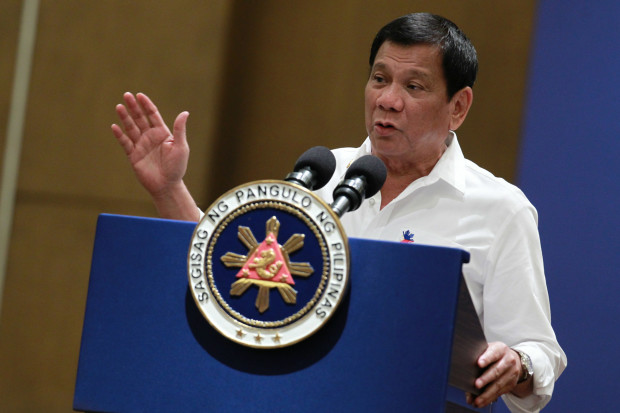President Rodrigo Duterte warned on Friday night that he may be forced to suspend the writ of habeas corpus if lawlessness in the country escalates, but he quickly added that he would not declare martial law.
Mr. Duterte made the statement in a speech after mentioning the rebellion in Mindanao, the worsening battle with the Maute group, and the alleged widespread illegal drug operations in the country. The Maute gang is a self-styled group of militants based in Lanao del Sur blamed for a September bombing that left 15 dead in Davao city.
“If lawlessness becomes widespread, I might be forced to—I don’t want to do it, I don’t want to. It’s just my warning to them. I don’t want it because it’s not good,” Mr. Duterte said in a mix of Filipino and English in a speech at an event to honor his mother’s humanitarian efforts.
“But if you force my hand into it, I will declare the suspension of the writ of habeas corpus, not martial law. I have no political plans,” he added.
Warrantless arrests
The suspension of the writ of habeas corpus would essentially allow warrantless arrests. The writ, if granted by the court, requires the state to produce the body of a person in custody.
The Constitution states that the President may suspend the privilege of the writ of habeas corpus in case of invasion or rebellion, when the public safety requires it, for a period not exceeding 60 days.
The late dictator Ferdinand Marcos suspended the writ in 1971 to suppress what he said was violence blamed on communist insurgents. Thousands were arrested or went missing during the two-decade Marcos regime, which was ended by the 1986 Edsa People Power Revolution.
Mr. Duterte said he might be left with no other remedy because he could not just issue an order. He would have to build a case one by one against suspects and once he declares the suspension of the writ, he said he would have them subsequently picked up.
“I will bring them to Samal, and put a hole in the middle so that it would sink and take them with it. They should choose,” he warned.
According to Mr. Duterte, he would declare the suspension of the writ of habeas corpus “if you don’t give me a choice and you box me in a corner and I find myself helpless.”
He stressed that the suspension of the writ was in the Constitution to protect the Republic of the Philippines.
“I can be ordered by the Supreme Court to stop it but there are things that they cannot, and maybe, I will not, stop. Whatever, I will tell them I will finish this first, then I can go to jail,” he added.
Prior to his warning, Mr. Duterte spoke extensively about the government’s campaign against illegal drugs, which he justified and which he said would continue throughout his term as long as there were drug lords and drug pushers on the streets.
The bloody campaign has left more than 4,000 suspected drug dealers and addicts dead, either slain in police operations or by unknown vigilante groups.
Perspective
Mr. Duterte noted that there were those who viewed the campaign as terrible, but this depended on one’s perspective.
“Mine is self-defense in defense of the helpless children who are not in a position to really weigh things. It is in defense of a race. It is in defense of my fellowmen,” he said.
Evidence of the social disfunction and the crimes that illegal drug use can cause are widespread, he maintained.
Narcopolitics is now a real problem in the country, indicating that drug lords supposedly wield extensive influence in the government, he said.
He noted that the number of drug users in the country could be about 4 million by the end of the year. He also repeated earlier figures that some 6,000 policemen were involved in the drug trade, as well as some 4,000 local officials, one or two congressmen, and four governors.
He said that even if he wanted to kill all those involved in drugs, he could not do so because he would run out of time.
Mr. Duterte also blamed Sen. Leila de Lima, a former justice secretary who is also one of his most vocal critics, for the expansion of the drug trade in the country.
“And whether she pretends to be what she is not, De Lima opened the portals of narcopolitics that started in the national penitentiary,” he said, referring to the extensive drug trade reportedly controlled by jailed drug operations.
The Philippines is currently under a state of national emergency on account of lawless violence in Mindanao, following the Davao bombing. This meant that troops, along with police forces, can be deployed to public areas and conduct searches. The declaration directs state security forces to suppress lawless violence in Mindanao and prevent this from spreading to the rest of the country.


